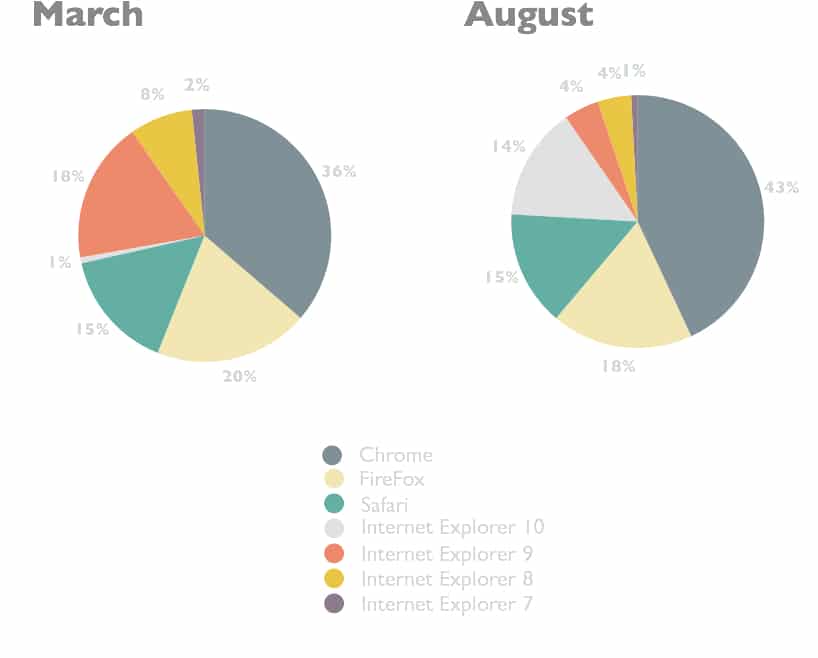Is your web browser ready?
The web browser is the unsung hero of the digital realm; every day it connects us to the rest of the world and provides us with information that stops our lives from being thrown into disorder, all the while (as if it’s no hassle at all) acting as the platform for the system that keeps our businesses moving.
Probably the web browser’s most admirable quality is humility – as crucial as it is, and as frequently as it’s used, it rarely draws attention to itself. It just sits there, facilitating an open web that allows us to do extraordinary things without distraction. Perhaps we are at risk of taking all this for granted – as a SaaS company we build and deliver products that live in the web browser, so to us it’s something that matters a great deal. Many internet users’ web browsers, however, lie in neglect and are rarely updated.
When we set out to build the next generation KashFlow application we knew that if we were going to deliver great user experiences with modern technology we would have to make some upfront decisions about which web browsers the application would support, and which it would not. Last month KashFlow was accessed by 243 different browsers, which is only a small fraction of those offered by different computers and portable devices. One person even accessed KashFlow on a Playstation 3 last month…who needs GTA V, eh?
From our perspective, it’s great news that over 70% of KashFlow users are using browsers that are both modern (benefiting from the latest HTML5, security and speed features) and evergreen (ensuring they stay up-to-date behind the scenes, with new versions being released very frequently) but a significant proportion of users are still using Internet Explorer.
The biggest problem with Internet Explorer is not the lack of features, the memory leaks or even the security holes, it’s that it doesn’t have an evergreen update policy – while 97% of Chrome users are using a very recent version (probably without even realising it), it often takes Internet Explorer users months or even years to upgrade their browser to the latest version.
Until recently supporting browsers that are, in some cases, over 5 years old has not been an enormous issue for us. But as we vamp up our technology, leveraging HTML5, it’s becoming apparent that supporting certain web browsers will result in a sub-standard experience being delivered to our customers. With this in mind, we are doing 2 things: first, we are encouraging our users to upgrade to a modern HTML5 browser and, second, we are dropping support for older browsers.
Therefore, it will not be possible to access the new KashFlow app in Internet Explorer 7 or 8. We also recommend that users of Internet Explorer 9 switch to an evergreen browser like Chrome, Firefox or Safari. If a browser change/upgrade isn’t possible, you can still use the app by installing Google Chrome Frame for Internet Explorer. It may seem like a radical move to reduce support for the default browsers of Windows XP and Windows Vista operating systems, and it’s not a decision we’ve taken lightly. However, there are a number of reasons why supporting old browsers negatively impacts our work at KashFlow –
- Supporting old browsers consumes development time that could otherwise be spent delivering new features
- Instead of being able to make use of new technological advances we risk being left with a product built on technology that is years out of date
- Old browsers not only provide a significantly inferior browsing experience to all web sites, but are also riddled with security issues
Of the many advantages to using a modern, evergreen browser, these are just a handful:
- Modern HTML5 browsers provide excellent browsing experiences that mirror what the creators of web sites and apps intend when they build them
- They are easily downloaded for free and update automatically*
- For users on older computers, a modern HTML5 browser will run noticeably faster than the browser that came installed**
The choices of modern HTML5 web browsers include Safari, Opera and Firefox, but we think the clear winner is Google Chrome – underneath the hood of a browser, Chrome is effectively a lightweight, lightning-fast operating system. It’s worth pointing out at this point that no users will be forced to move over to the new KashFlow app when it is released, but if you’re still using an old, outdated browser hopefully this post has convinced you to upgrade anyway…
*Although, with the release of Internet Explorer 10 (available on Windows 7 and 8), Microsoft has finally made some effort to catch up with the competition they still haven’t implemented a regular update cycle.
**This is due not only to modern browsers being significantly optimised but also because many web sites, when run in an old browser, load performance-expensive scripts that simulate the features of modern browsers.

